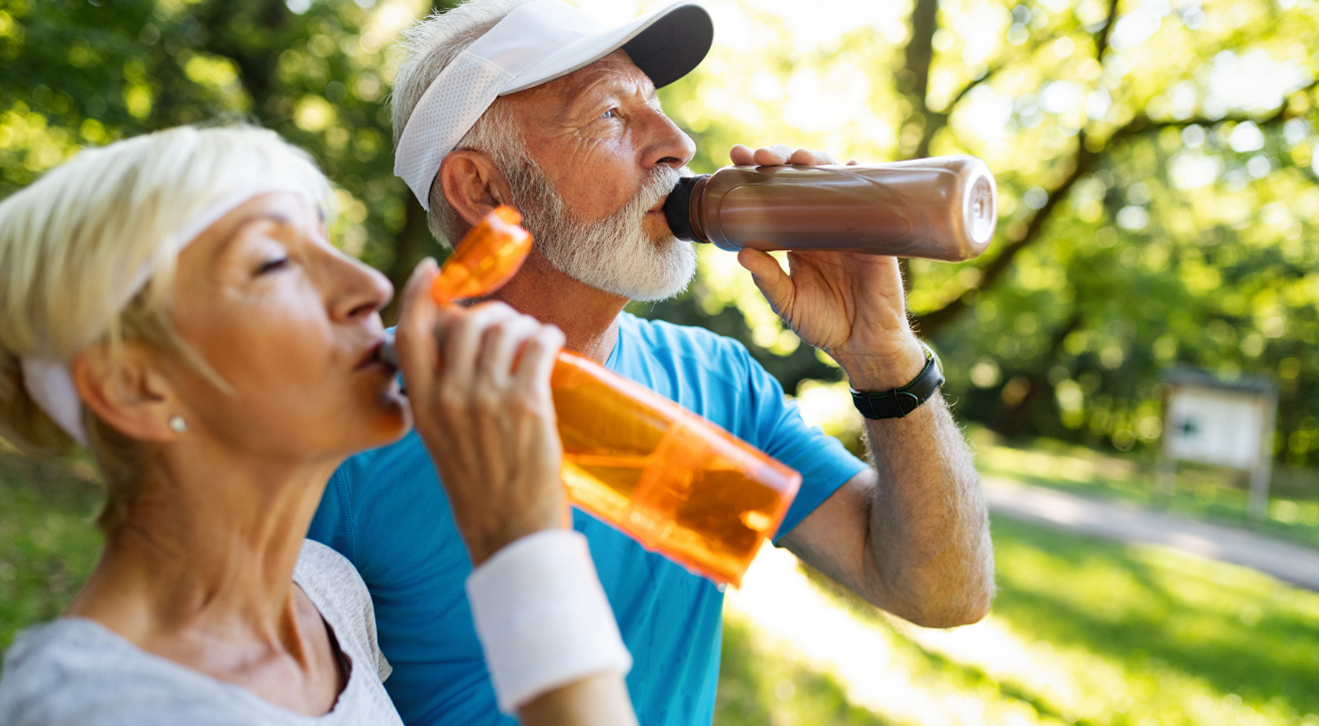Hydration for Older Adults to Feel Their Best

Summer is here! Staying hydrated is always important. And the hot summer weather is a good reminder to keep an eye on how much water you are drinking.
Hydration health is an important topic for older adults who want to feel their best as they age. According to the Agency for Health Research and Quality, adults older than 65 continue to have the highest rates of hospital admissions for dehydration as a primary diagnosis with those older than 75 having the highest rates. These rates are high for something that can potentially be prevented.
Every day we lose water through our skin, lungs, kidneys, and gastrointestinal tract as a normal part of our body’s process. And aging adults may have a reduced sense of thirst. Because the brain is not sending an early signal telling the older adult that they are thirsty, they may be at a higher risk of dehydration. Cognitive impairment or memory loss can certainly play a role in this effect as well.
Hydration is a key component of health, especially for seniors and baby boomers. As we age, our bodies’ ability to conserve water decreases, making it more important than ever to ensure adequate fluid intake.
More Facts About Hydration for Aging Adults
Did you know that our bodies are overall composed of 55 percent to 65 percent water but as we age this composition changes? So, as we get older, the amount of water in our bodies naturally decreases so we need to work harder to maintain a healthy balance.
Between 17 percent to 28 percent of older adults are affected by dehydration. For us to feel at our best, we must be diligent about drinking enough water and staying hydrated.
Dehydration occurs when there’s excess fluid loss from the body. Common causes are illnesses such as urinary tract infections, pneumonia, or other infections in the body. Various medications can cause fluid loss. In addition, exposure to high temperatures on hot days and increased exercise can also put aging adults at risk for dehydration.
Physical and cognitive impairment can occur for aging adults with a decrease of as little as 2 percent to 3 percent of body fluid which goes to show how imperative it is to stay well hydrated.
What are Signs of Dehydration?
Some signs of dehydration include dry mouth, constipation, dry skin, decreased tear production, decreased energy or dizziness, and decreased urine output. Unless you are on a medication that affects the color of your urine, typically your urine should be a nice clear yellow. If you notice that your urine is getting darker that can be an indication that you want to increase your fluid intake or perhaps have some electrolyte water.
 Now if you are seeing this darker color urine with other symptoms, then you certainly want to check in with your healthcare provider.
Now if you are seeing this darker color urine with other symptoms, then you certainly want to check in with your healthcare provider.
Some people have an incontinence issue that can lead to dehydration. Being afraid that they will not be able to get to the bathroom in time can be a barrier that has to be overcome to remain hydrated.
Symptoms of ongoing dehydration can include low blood pressure and excessive sleepiness. It can lead to urinary tract infections or kidney infections.
And you may also experience an increased heart rate as your body tries to compensate for a lower volume of fluid and the heart pumps faster. Dehydration is linked to increased falls risk. Falls are never positive and raise a heightened concern for people on certain medications such as blood thinners.
What to Avoid to Help with Hydration Health
It is a good idea to avoid or moderate your intake of certain things to help with hydration health. For instance, caffeinated beverages and alcohol have diuretic properties. This can make you go to the bathroom and in turn, dehydrate you if you have an excess amount.
Having it in moderation — one or two cups of coffee or tea or a single serving of alcohol – should be fine for most people. A good substitute can be a caffeine-free tea or decaffeinated coffee (although even decaf coffee retains some caffeine).
Fruit juices are another type of beverage that should be consumed in moderation. They tend to have quite a bit of sugar. For people with underlying medical conditions such as diabetes or others requiring caution with caloric intake, it is especially important to monitor how much fruit juice you drink.
Consider mixing 50 percent juice with 50 percent water to add some flavor to your water without all the sugar. Or instead of fruit juice, choose whole fruit or vegetables. Some good choices include oranges, pears, apples, melons, berries, celery, pineapple, tomatoes, or avocado.
Three Tips to Help Maintain Hydration
- Keep Water Accessible: Keep water within reach whenever possible. This makes it more likely that you will drink throughout the day rather than waiting until you feel thirsty.
- Eat Water-Rich Foods: Incorporate fruits and vegetables with high water content into your diet. Foods like cucumbers, tomatoes, oranges, and melons can contribute to your daily water intake.

- Establish a Routine: Set reminders to drink water or establish a routine such as starting to hydrate early in the day or drinking a glass of water before each meal. Some people like to keep a tally of their daily water intake. All these things can help make hydration a regular part of your day.
Staying hydrated can help prevent various health issues and contribute to overall well-being, so it is crucial to adopt habits that support adequate hydration.
Hydration: What is Best for You
Hopefully, from this information, you will see how adequate hydration plays such a vital role in some many parts of our bodies. Once you have an awareness of hydration health, you can take steps to reduce the risk for these symptoms. What it takes for you to be hydrated is individualized to your body.
So, you should speak with your medical provider regarding the appropriate intake for you with medical conditions that you have and medications that you may be on. Then you can set a daily goal for yourself.
And if you are a Friends Life Care member and have questions about hydration, you can also contact your Care Coordinator.
Leave a Comment
